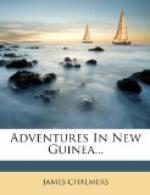The teachers were landed in the afternoon, and were well received. The natives all promised to care for them, and treat them kindly. There are about two hundred and fifty natives on the island. No Ellengowan appearing, we determined to leave this on Wednesday, the 21st, and to proceed to Moresby Island. Next morning we left, but, owing to light winds, we did not anchor in Hoop-Iron Bay, off Moresby Island, till the morning of the 22nd. The anchorage here is in an open roadstead. It is a very fine island—the vegetation from the water’s edge right up to the mountain tops. Plantations are to be seen all round. The people live in small detached companies, and are not so pleasant and friendly-looking a people as are the Teste islanders. This is the great Basilaki, and the natives are apparently the deadly foes of all the islanders round. Before we anchored, we were surrounded by catamarans (three small logs lashed together) and canoes—spears in them all.
Mr. McFarlane decided, as soon as we came to the island, that he would not land his teachers here; and I did not consider it a suitable place as a head station for New Guinea. We left Moresby Island at six a.m. on the 23rd inst., and beat through Fortescue Straits, between Moresby and Basilisk Islands. The scenery was grand—everything looked so fresh and green, very different from the deathlike appearance of Port Moresby and vicinity. The four teachers were close behind us, in their large whale-boat, with part of their things. On getting out of the Straits, we saw East Cape; but, as there was no anchorage there, we made for Killerton Island, about ten miles from the Cape. The wind being very light, it was eight p.m. before we anchored: the boat got up an hour after us. There was apparently great excitement ashore; lights were moving about in all directions, but none came to us. In the morning, a catamaran with two boys ventured alongside of us; they got a present, and went away shouting. Soon we were surrounded with catamarans and canoes, with three or four natives in each. They had no spears with them, nor did they kill a dog on our quarter-deck, as they did on that of the Basilisk. They appeared quite friendly, and free from shyness. They brought their curios to barter for beads, red cloth, and the much-valued hoop-iron. The whole country looked productive and beautiful. After breakfast, we went ashore, and were led through swampy ground to see the water. On our return to the shore, we went in search of a position for the mission settlement, but could not get one far enough away from the swamp, so we took the boat and sailed a mile or two nearer the Cape, where we found an excellent position near a river. Mr. McFarlane obtained a fine new house for the teachers, in which they are to remain till they get a house built. We took all the teachers’ goods ashore, which the natives helped to carry to the house. One man, who considered himself well dressed, kept near us all day. He had a pair of trousers, minus a leg: he fastened the body of the trousers round his head, and let the leg fall gracefully down his back.




